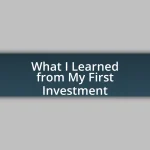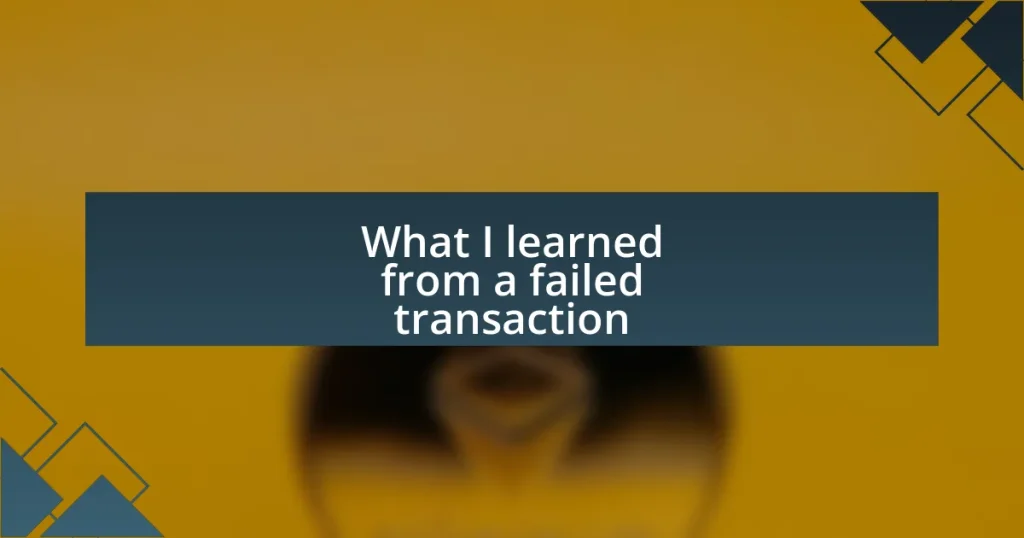Key takeaways:
- Failed transactions can reveal important insights about financial habits and encourage proactive management of finances.
- Common reasons for transaction failures include technical issues, insufficient funds, and human errors, emphasizing the need for careful monitoring and attention to detail.
- Reflecting on past experiences can foster resilience, allowing individuals to learn from mistakes and cultivate a growth mindset.
- Building a support system and embracing patience can enhance decision-making and mitigate potential setbacks in future transactions.
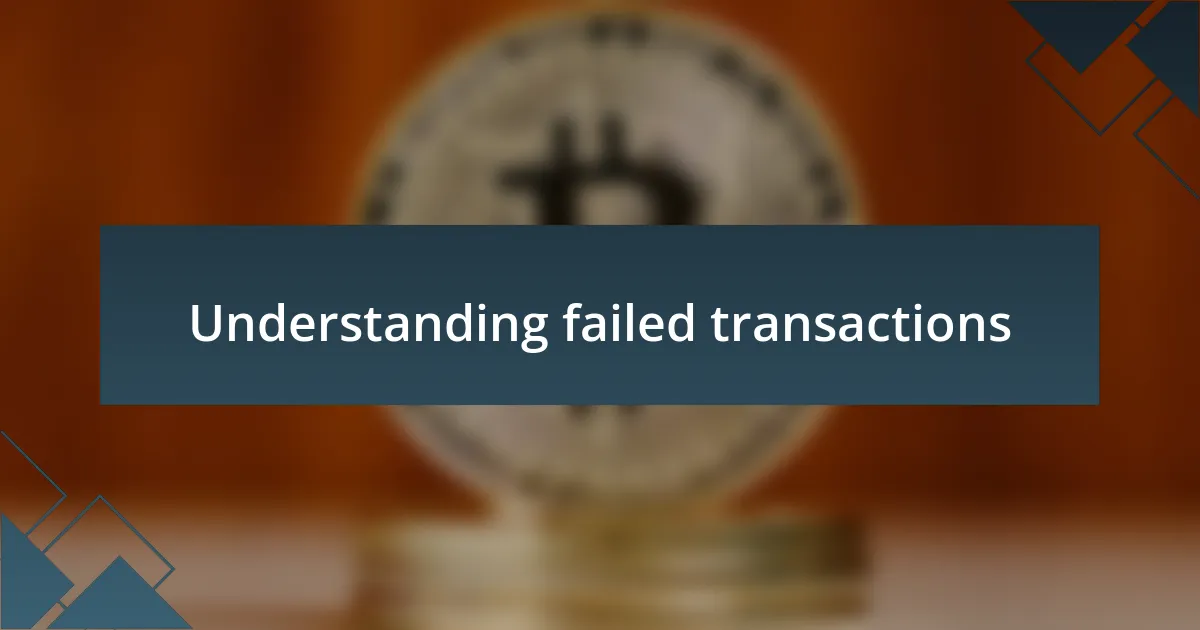
Understanding failed transactions
Failed transactions can often feel like a slap in the face. I remember one time attempting to purchase an item online, only to have my payment rejected. The instant disappointment was overwhelming—why did this happen? It’s a situation many of us have experienced, and it often comes down to technical issues, insufficient funds, or even simple human errors, reminding me that even a small oversight can lead to significant hurdles.
What I’ve learned from these experiences is that failed transactions can reveal crucial insights about our financial habits. For instance, when my card didn’t go through, I realized I was often careless about checking my account balance before making a purchase. This situation pushed me to become more mindful and proactive in managing my finances, turning what felt like a setback into an opportunity for growth.
Sometimes, the emotional weight of a failed transaction transcends the monetary aspect. I felt insecure and even embarrassed when I couldn’t complete that online order in front of my friends. It sparked a thought—how do we allow these small setbacks to affect our self-esteem? Understanding that failed transactions are common can help us navigate those feelings, fostering a sense of resilience rather than discouragement.
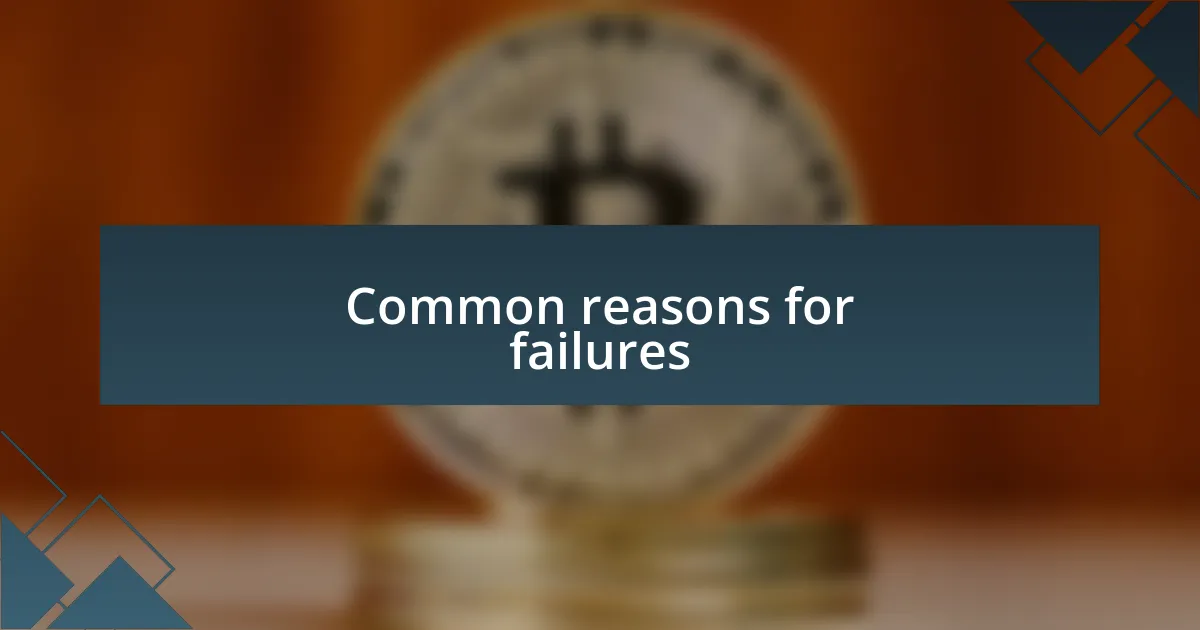
Common reasons for failures
Many failed transactions stem from technical glitches that are often out of our control. I recall a time when a site crashed as I tried to finalize a purchase. The frustration was palpable—a seamless shopping experience quickly derailed by a server error. It taught me that even technology, which we often rely on, can fail us unexpectedly, leaving us in limbo.
Another frequent cause of transaction failures is insufficient funds. I vividly remember a moment when I confidently tried to buy concert tickets, only to be met with a notification stating my balance was lower than required. The letdown stung, but it underscored the importance of regularly monitoring my spending habits and maintaining a budget. It’s a reminder that proactive financial awareness can prevent such embarrassing situations.
Human error is, perhaps, the most relatable reason for transaction failures. I’m sure many can identify with the sinking feeling of mistakenly inputting the wrong card number during checkout. I’ve done it more than once, and each time it prompts a moment of self-reflection. These slip-ups remind me to slow down and double-check details because even small mistakes can lead to significant setbacks.
| Reason for Failure | Example |
|---|---|
| Technical Glitch | Site crashes during checkout |
| Insufficient Funds | Attempting to buy tickets with a low balance |
| Human Error | Wrong card number entered |
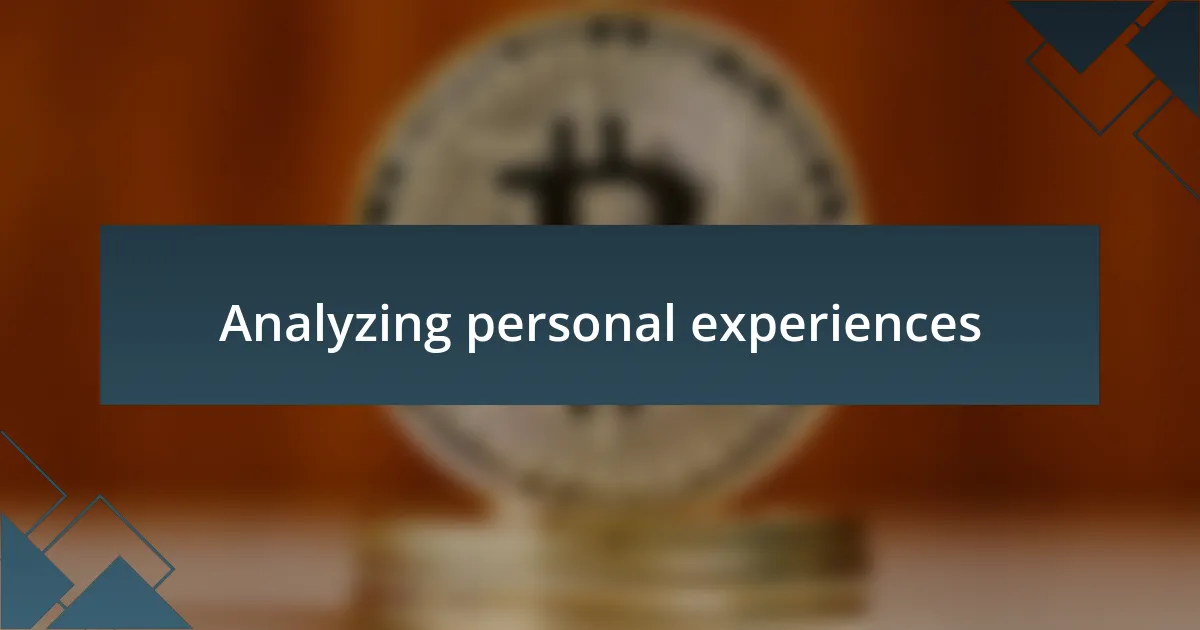
Analyzing personal experiences
Reflecting on my own experiences, I’ve realized that failed transactions often reveal deeper insights about our habits and preconceptions. For instance, after a frustrating encounter where I accidentally canceled a subscription I needed, I felt a rush of worry and disbelief. This incident was a wake-up call, nudging me to familiarize myself better with the platforms I use and how my decisions—often impulsive—can have lasting consequences.
- Embracing technology’s quirks reinforces the need for patience.
- Examining financial habits fosters a proactive mindset.
- Learning from errors prompts more careful interactions online.
In another instance, I eagerly attempted to purchase a limited-edition item that vanished from my cart during the checkout process. My heart sank as I realized I didn’t act quickly enough. This experience taught me the importance of decisiveness and foresight in a consumer-driven world where opportunities can slip away in an instant. It’s these moments that prompt not only personal growth but also a strategic shift in how I navigate future transactions.
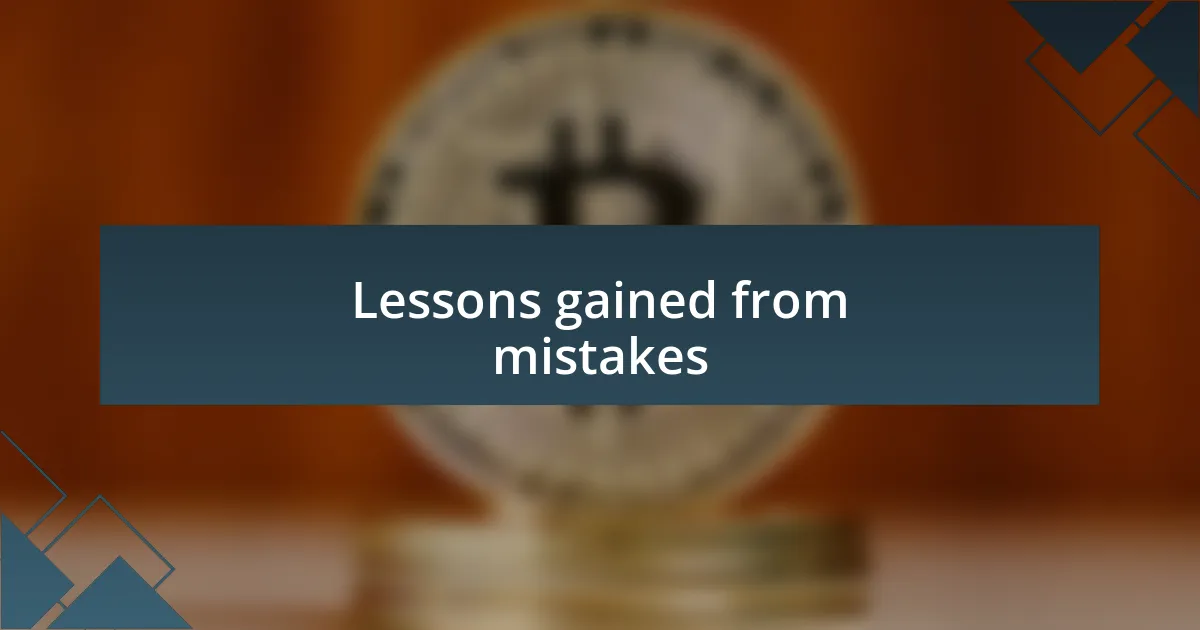
Lessons gained from mistakes
Making mistakes can feel discouraging, but each one can be a teacher if we’re willing to listen. One time, I miscalculated my budget before making an online purchase, which led to an unexpected overdraft fee. That moment was incredibly stressful, but it forced me to reevaluate my financial planning and approach to budgeting. How many of us rush through our finances without a second thought? I learned that slowing down can save not only money but also mental anguish.
There was also a time when I misunderstood a return policy, which resulted in me keeping a product I wasn’t satisfied with. The frustration of knowing I could have avoided that hassle was palpable. This experience opened my eyes to the importance of thoroughly reading terms and conditions and asking questions when something isn’t clear. It’s funny how a little diligence upfront can prevent headaches down the line, right?
Each failed transaction has added a layer to my understanding of consumer behavior. Recently, I approached a purchase with a newfound skepticism, asking myself if it was truly necessary. This practice has not only saved me money but also made me more aware of consumer culture’s pressures. Have you ever thought about how our buying habits reflect our values? Reflecting on these moments encourages a more mindful approach to spending and, ultimately, brings a sense of empowerment in managing my financial decisions.
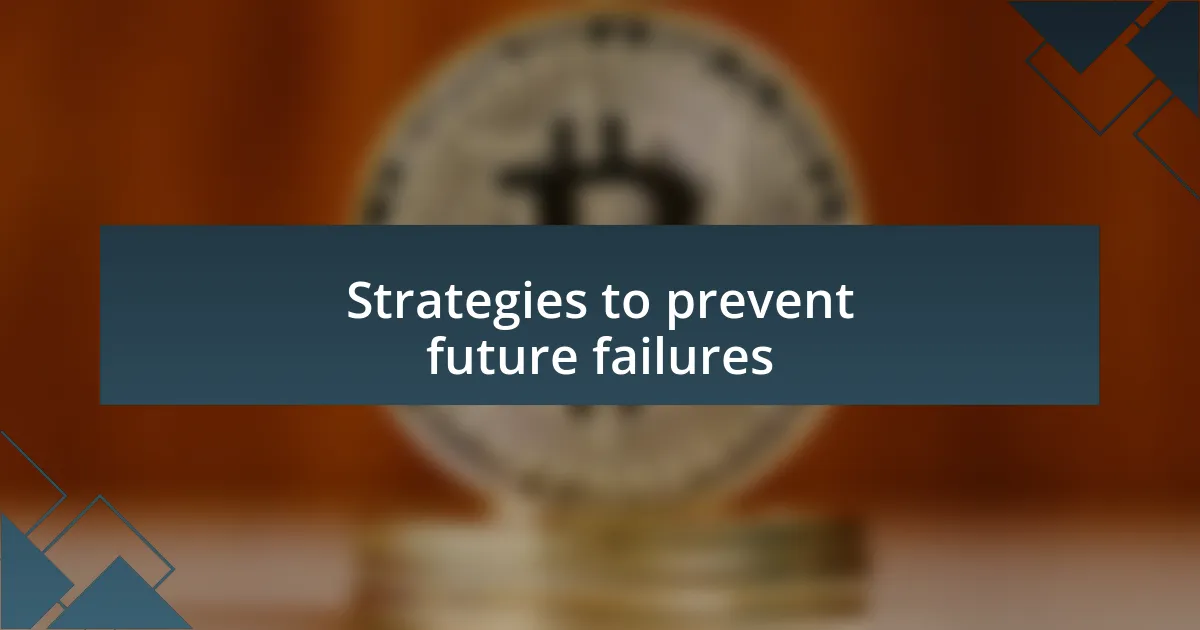
Strategies to prevent future failures
One strategy that has significantly improved my transaction success is maintaining detailed records of my purchases and transactions. After one frustrating instance where I lost track of an order, I realized how crucial it is to have all relevant information at my fingertips. Now, whenever I make a purchase, I jot down key details like confirmation numbers and dates, so I’m never left questioning what happened if an issue arises. Have you ever struggled to remember the specifics of a transaction?
Communication has also been a vital tool in overcoming potential failures. I learned this the hard way after a miscommunication led to a delayed shipment of a much-anticipated item. Now, I always reach out for clarification when I’m uncertain about product availability or shipping times. Isn’t it interesting how a simple phone call or email can save us from the stress of unmet expectations?
Lastly, I’ve made a habit of setting aside time to research a product or service before making a decision. There was a time I rushed into a purchase because it seemed like a great deal, only to discover later that it was subpar. Investing a little time to read reviews and check ratings has proved invaluable in ensuring I spend my money wisely. How often do we prioritize convenience over informed decision-making?
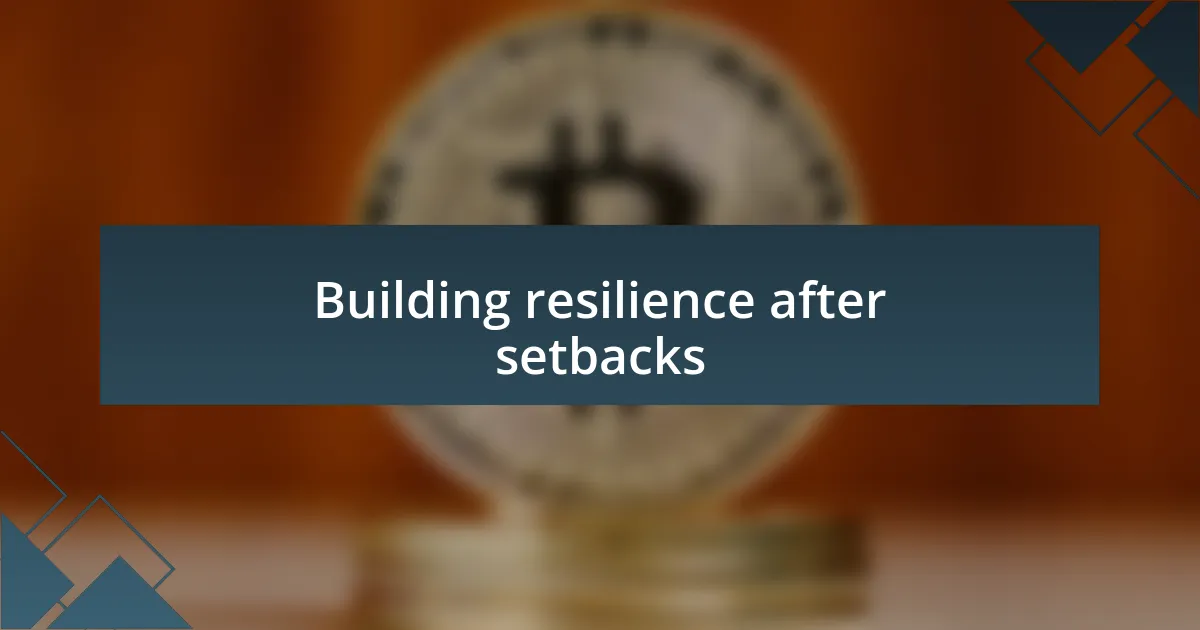
Building resilience after setbacks
When faced with setbacks, I’ve learned the importance of reframing my mindset. I remember a time when a transaction fell through, leaving me disheartened. Instead of dwelling on my disappointment, I chose to see it as an opportunity for growth. By reflecting on what went wrong, I was able to develop a more proactive approach in future dealings. Have you ever found that stepping back can lead to valuable lessons?
Resilience also comes from cultivating a support system. After a particularly frustrating experience with a failed transaction, I shared my story with a friend who had faced a similar issue. Their insights helped me process my emotions and shift my focus to solutions rather than problems. This reminded me that community can be a powerful ally when bouncing back from setbacks. How might leaning on others help you navigate your own challenges?
Additionally, I’ve discovered that embracing a growth mindset is pivotal in building resilience. I once struggled with a failed service subscription, and rather than viewing it as a personal failure, I regarded it as part of my learning journey. By acknowledging that mistakes are integral to improvement, I’ve learned to approach new transactions with a sense of curiosity and optimism. How do you perceive your setbacks— as obstacles or learning opportunities?
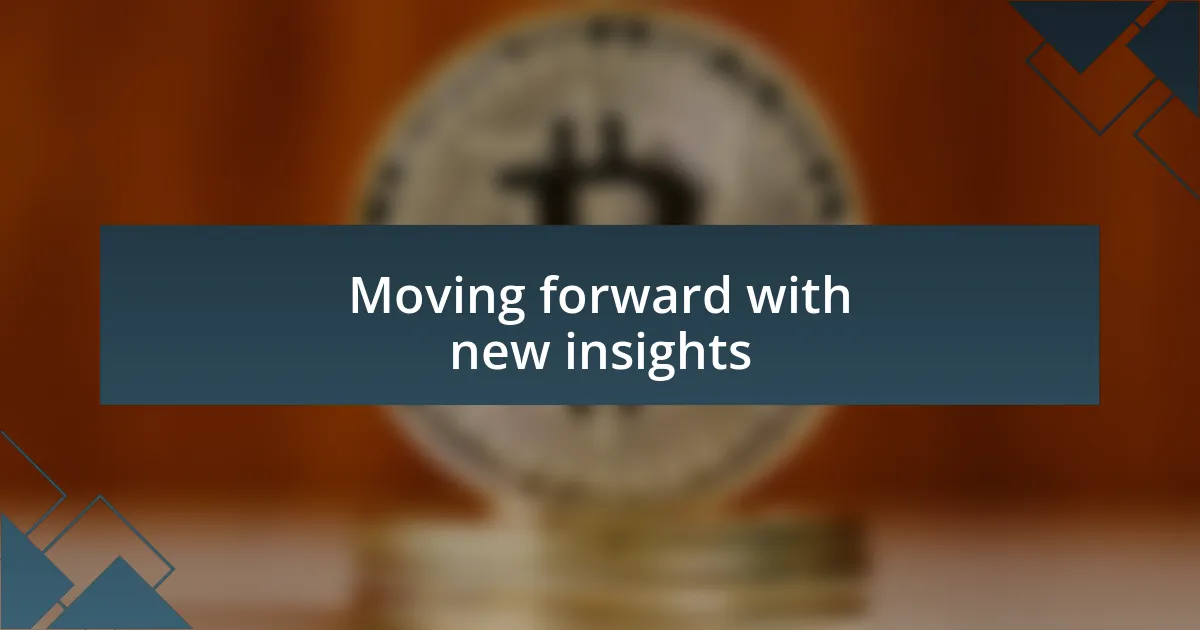
Moving forward with new insights
Moving forward, I realize that each experience can spark an unexpected insight. After my recent transaction hiccup, I took a moment to dissect every step taken leading to that outcome. Surprisingly, I found areas where I had rushed my decisions, reminding me that patience is often a key ingredient in the recipe for successful negotiations. Have you noticed that slowing down can sometimes lead to clearer thinking?
I also found that the power of reflection is profound. Sharing my experience with colleagues not only provided me with a fresh perspective but also revealed common pitfalls we all face. Their stories mirrored mine, creating a sense of camaraderie and reminding me that I am not alone on this journey. How often do we miss out on learning from others because we don’t share our own stories?
Lastly, I’ve come to understand that each setback comes with a unique lesson. When I think back to those frustrating moments, I feel a mix of frustration and gratitude; they pushed me to refine my approach and hone my skills. Embracing this perspective has transformed my outlook, turning barriers into stepping stones. What lessons have your transactions taught you?





